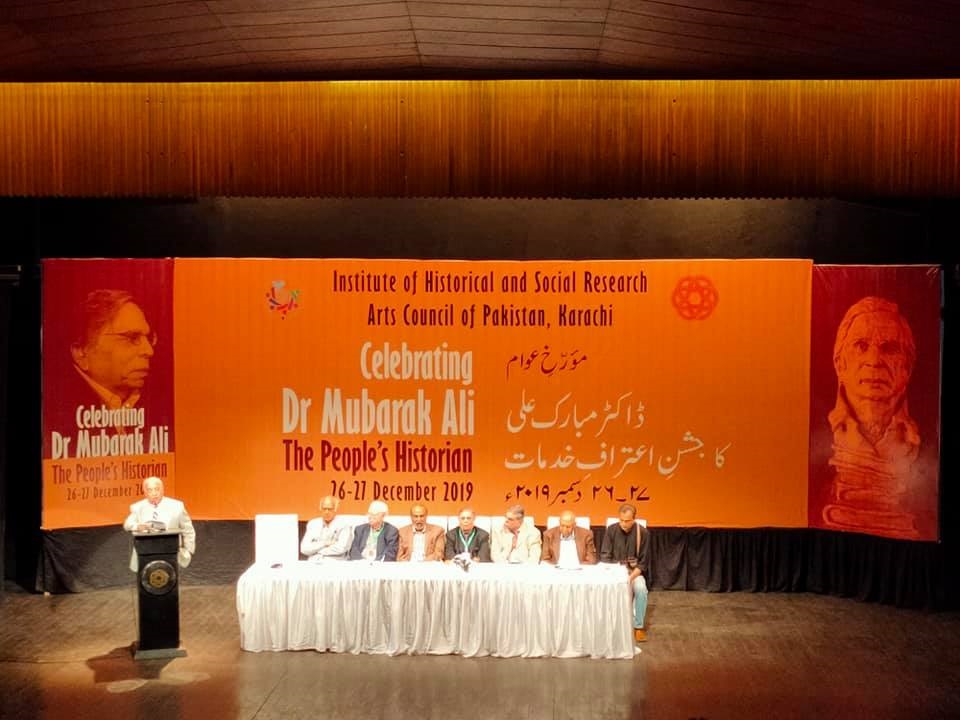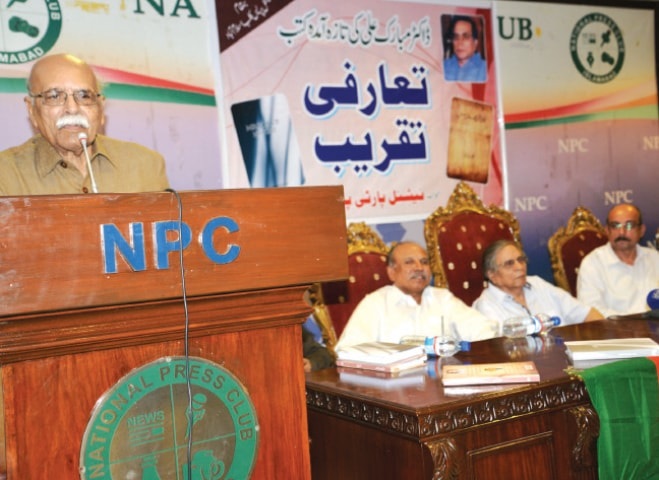Written by: Waseem Abbas
Posted on: July 14, 2023 |  | 中文
| 中文
Dr. Mubarak Ali (Picture credits to Dawn)
Is history neutral? How to write history without distorting the truth? How to challenge the official version of history, which is often sanitized to suit the powers that be? These are the questions a historian must ask and answer, and rarely a few historians have done so. Pakistan’s Dr. Mubarak Ali is one such a rare gem, whose historic revisionism has been both popular and effective.

A conference celebrating Dr. Mubarak’s contribution at the Arts Council of Pakistan (ACP), Karachi, in 2019
South Asian history is replete with historical inaccuracies, often driven by racial, nationalistic and religious biases. The popular history in India peddles 'anti-Muslim', 'anti-Mughal' and 'anti-Pakistan' narratives, while historical chronicles in Pakistan abound with 'anti-Hindu' and 'anti-India' ideals. Each side boasts a 'national grandeur' in its official history and curriculums, while its neighbors are depicted as the reason for all the evils that have engulfed the world. The historical accuracy, or neutrality, is nowhere to be seen. History is written from the perspective of those at the top, as ‘national needs’ are kept at the top while writing historical accounts. This leads to the production of historical accounts that are far from the truth, misleading the coming generations
Dr. Mubarak Ali calls for rewriting the Indian Subcontinent’s history and removing the ‘historical aberrations’, so that misunderstandings and animosity between Hindus and Muslims (India and Pakistan) is decreased and diminished. Dr. Mubarak Ali believes that right-wing Hindus in India needlessly criticize the Mughals, and attribute every ill in India to the bygone Mughal rulers. Similarly, Muslims in Pakistan would not mention Ashoka or any other Hindu figure in its history due to religious biases. The British colonialists, in Dr. Mubarak's view, were responsible for fostering animosity between the two communities, in their pursuit of divide and rule.
When we read history, we get to know about the conquests and the conquerors, kings and priests, and the national heroes who miraculously and singlehandedly salvaged the nation, but beneath all this historical gimmickry, we tend to overlook the history from the perspective of common people. Dr. Mubarak Ali points out that in history patronized by states, the cultural, social and the common people's history is often unexplored. Syed Jaffer Ahmed Ali writes in his book Challenges of History Writing in South Asia that “Being a historian, the most significant thing about Dr. Mubarak Ali is that he has written for the people and on the people, instead of just writing about kings and heroes."
While explaining how the selective use of historical materials can lead to erroneous conclusions, Dr. Mubarak Ali discusses the Mughal downfall as an example, for the Islamist-cum-nationalist curriculum in Pakistan attributes the downfall of the Mughals to Emperor Akbar for his alleged propagation of Deen-e-Elahi (Religion of God), and gives a clean chit to Emperor Aurangzeb. When the need for a new "Islamic State" (Pakistan) demanded, the reason for the fall of the Empire was squarely put on the rulers' estrangement from religion and on the cunning Hindu traders, disregarding the socio-political and economic conditions of the era.
When Pakistan came into being and the ‘national historical narrative’ was yet to be established, Pakistan premised its national history on the 'Two-Nations Theory' to achieve greater national unity between various factions and racial groups. Curriculum books were written, tracing the origins of Pakistan to Muhammad bin Qasim’s attack on Sindh in 712 AC, as per Dr. Mubarak, disregarding the fact that the Indus Civilization is an inseparable and proud part of our glorious history.
What distinguishes Dr. Mubarak from his fellow historians is his critical approach to history. He believes "History is not just compiling and recording past events. Its real work lies in analyzing the events." When most of his contemporaries toed the State's line, Dr. Mubarak focused on an objective interpretation of past events and societies, without which it is impossible to move forward in the right direction and do course corrections. Nicknamed ‘people’s historian’, Dr. Mubarak Ali believes that without secularizing history, it is impossible to find the truth and tell the truth. The state narrative needs to be questioned, and history needs to be written from the bottom-up approach: from the perspective of common people, villagers, industrial workers, nomads, artisans, musicians and even dacoits and thieves, as those are the people who constitute a society.

Ashfaq Saleem Mirza speaks during the launch of Dr. Mubarak Ali’s books. (Photo by Ishaque Chaudhry)
Dr. Mubarak Ali (born in 1941 in Tonk, Rajasthan, India) has published over 60 books and thousands of articles on Indian history and its various aspects, often expressing his views while keeping the perspective of the common people in mind. He is known for his liberal views, which explains why he is still unknown to the majority in Pakistan. Along with his academic pursuits, he has been an activist-cum-editor for over 50 years.
The vast majority of Dr. Mubarak Ali's publications are in Urdu, as his primary audience understands Urdu. His famous books include Taareekh ki Daryafat (History’s Findings), Qadeem Hindustan (Ancient India), Bartanvi Hindustan (British India), Hindustan ki Tareekh (Hindustan’s History), Aakhri Ehad Mugliah ka Hindustan (India in Last Mughal Rule), Taarikh aur Falsfa-e-Taarikh (History and Philosophy of History), Tarikh aur Mazhabi Tehreekein (History and Religious Histories), Tarikh or Aurat (History and Women), Sindh ki Samaji or Saqafti Tareekh (Sindh's Social and Cultural History), Tareekh Fehmi (Understanding History) amongst others.
He is the recipient of various awards and accolades including the Faiz Ahmed Faiz Award and Khwaja Ahmad Abbas International Award by the Pakistan Academy of Letters. He has a Ph.D. in the 'Mughal Period India' from Ruhr University, Bochum, Germany, and has taught history at Sindh University, Jamshoro, for most of his professional life. The 82-year-old historian lives in Lahore with his family and attends seminars and conferences both nationally and internationally. While Dr. Mubarak Ali is living his post-retirement life, his writings stimulate and teach his readers to question the official version of history, and helps them widen their horizons.
You may also like: